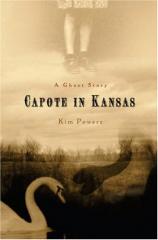Reading Group Guide
Discussion Questions
Capote in Kansas: A Ghost Story

1. Did you previously know these basic facts of the relationship between Capote and Lee - that they were next door neighbors as very young children, and that they reunited again to work on In Cold Blood together?
2. Who would you say is the more important character in the book -- Truman Capote or Harper Lee -- or are the equal?
3. If you had previously read To Kill a Mockingbird, does "Capote in Kansas" enhance your understanding of it: who Harper Lee was as a little girl, her relationship with her lawyer father Amasa, her relationship with Truman Capote (the model for Dill Harris), the role Boo Radley played in the neighborhood?
4. Since relatively little of the book actually takes place in Kansas, do you think the title is misleading? What other possible titles come to mind?
5. Does the author's disclaimer that this is a work of fiction --- and his note detailing what's real in the book and what isn't --- help you read this as a novel, or did the fact that it's about real people cause you to read it as more of a biography?
6. Have you ever done what Truman Capote did to Harper Lee: call an old friend up, out of the blue, after a long absence? Why did you do it? What were you hoping the result would be?
7. How did you interpret the "ghosts" of the Clutters? Real ghosts, or figments of the imagination, or dreams? Have you ever had a dream that felt so real, so unsettling, you thought it might have been a ghost coming to visit you? Did the spirits of the Clutters seem threatening? Why did they need to see Truman and Harper - or is it more that Truman and Harper needed to revisit THEM?
8. Why do you think the fictional Truman, at the end of his life, started sending the mysterious packages to Harper? Does he seem to be aware that he's in his final decline, and doesn't have much time left to make whatever amends he has to make with her? Why did he chose something so macabre --- photographs inside little handcarved coffins --- as a way to make peace?
9. Does Harper seem to dwell on the fact that she hasn't written another book? Does her "legacy" seem to prey on her, the way Truman's does? What do you think of Myrtle's reflection on her legacy --- wet clothes drying on a clothes line, the smell of which takes Truman back to the happy time of his childhood? Do you necessarily have to leave something "big" as your legacy? When a book is as good as To Kill a Mockingbird, do you think it's "okay" that the author never wrote another one? As artists, did Truman Capote or Harper Lee have an obligation to continue writing for the public?
10. Does what the author has done to Truman Capote and Harper Lee --- writing versions of their lives --- seem to mirror what Capote and Lee did to the Clutters? Do you think that was deliberate on the author's part?
11. What would these fictional versions of Harper Lee and Truman Capote say were the happiest times of their lives? Their childhoods? The time of their greatest fame, when their well-regarded books first came out? The end of their lives, when they could sit back and reflect, with all the wisdom they had hopefully gained through the years?
12. Clearly Capote's fame crippled him to some extinct, after the success of In Cold Blood, when he was no longer able to write as well, or as much. Was that success and fame ultimately a blessing --- or a curse?
13. How were you affected by the relationship between Truman and his housekeeper, Myrtle Bennett? Do you find it ironic that a man of such great fame and wealth would have one of his most intimate relationships with an uneducated maid, whom he pays to work for him?
14. What was your reaction to the two letters Harper Lee writes to her dead brother Ed? Did it seem an effective device to let you into her inner thoughts, or bizarre and unlikely? Can you think of any other way the material in those letters might have been handled?
15. What do you think the real Truman Capote would have thought of this book? The real Harper Lee? If the book had been written as a "roman a clef" --- where it was clearly about them, but with their names changed --- would it have been as effective?
16. As monstrous as Truman Capote is in certain parts of the book, and by reputation, what is your final opinion of him? A monster --- but do you understand why? Someone sad and sympathetic?
17. By the end of the book, how do you think Harper Lee regards her once best friend Truman Capote? As an evil, malicious character, or one who sadly lost his sensitivity, in a fog of booze and pills? When the kite unfurls with the words "I'm Sorry" in the very last line of the book, do you think the character of Harper would respond, "You're Forgiven?"
Capote in Kansas: A Ghost Story
- Publication Date: November 2, 2007
- Hardcover: 256 pages
- Publisher: Carroll & Graf
- ISBN-10: 0786720336
- ISBN-13: 9780786720330







